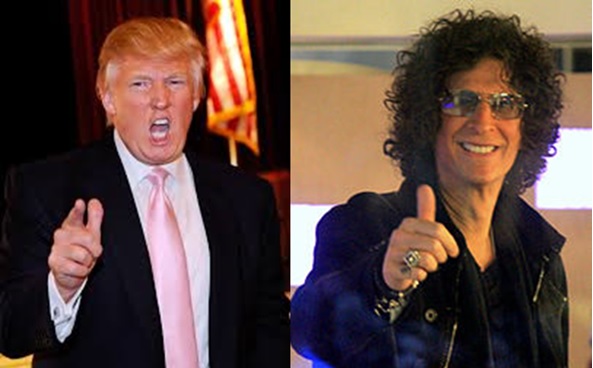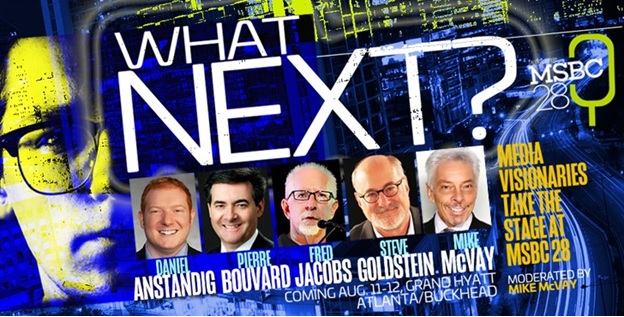
These days, everyone is still trying to come to grips with Donald Trump’s appeal – especially how big it is and how deep it runs. If you’re one of those people trying to explain the phenomenon, figuring out how it happened and whether it will translate into the most important metric of all – winning a majority of the Electoral College votes – you aren’t alone.
Donald Trump is trying to figure it out, too.
There are lots of different “takes” on the political story of the year, and it’s fascinating that some of them have roots in radio. Last week, an opinion piece on CNN.com written by Will Bunch featured this headline: “Howard Stern Gave Us Donald Trump.”
Bunch notes that Trump has succeeded “by tapping into the very same zeitgeist that launched Stern to prominence three decades ago.” He points out that Stern explained his success to Rolling Stone by observing that the white, suburban uber-fans he aggregated were “sort of the skeptical, cynical, I-don’t-give-a-f***in’-think-I-hear people.”
That statement rings with truth. Problem is, success for Howard Stern back in the terrestrial radio days was roughly composed 7-10 percent of all people listening to the radio during morning drive. In radio, that’s a pretty solid share, enough for a syndicated show. And on Sirius, it just takes a couple million subscribers to keep his satellite radio bosses happily extending his contract.

Trump has a more daunting task – winning over a majority of U.S. voters, and pulling that off in markets – or in this case, states – that matter in the final analysis.
And so lately, Donald Trump has expressed some of the very same frustrations that you hear DJs and programmers whine about when they’re seeing big crowds at station events or watching the phones “ringing off the hook,” but getting Nielsen ratings that are nowhere enough to declare victory.
In an article on Politico.com, Cristiano Lima brought home this point. Trump’s events often draw 20-30,000 very enthusiastic and engaged supporters. At a large rally in Jacksonville, he wondered out loud:
“I don’t know why we’re not leading by a lot.”
I’ve heard many DJs and radio personalities say the exact same thing.
When you see large crowds and your inner-circle is telling you how great you are, it’s often the first sign you may be out of touch with your true appeal. This is one reason why PDs sometimes have trouble making their points when it comes to addressing problems or overcoming challenges when all talent hears are accolades from fans and sees great turnouts at station events.
Apparently, there are a number of Republicans having similar problems getting through to their party’s candidate because he’s fixated by those massive crowds and the unbridled support he hears across America. It is easy to conclude these uber fans represent the entire audience, but that’s rarely the case. Over-reaching with the core at the exclusion of the masses is something many radio personalities suffer from, along with politicians throughout history. The gap between what our gut tells us about the size of the audience and what the ratings or polls tell us is often frustratingly wide. And by the way, neither are rigged.
And that’s why smart stations – and savvy politicians – conduct their own proprietary research. The idea has always been to measure audience attitudes, perceptions, and behaviors in an unbiased setting, far from the madding crowds. But even with hard data, emotions often take over, making it challenging at times to coach those seeking ratings and those seeking office.
This week, I’ll be on a great panel at Don Anthony’s “Morning Show Boot Camp” in Atlanta, talking about some of these same issues. I’m sure my fellow panelists will readily agree about the importance of talent to radio’s hopeful future in a landscape that’s become more crowded and an audience that’s become more fickle.

As we see pure-plays integrating spoken word components and even developing products that feature personalities, we know this is a game that radio can play better than anywhere else.
But radio’s continued success is contingent on being able to effectively coach talent and help them understand the changing world around them. It about trying to get them to acknowledge that feedback from their friends and over the phone may not be representative of the larger audience, and accepting the wisdom of listening to the advice of others in a position who can maintain a cool level of objectivity.
I love the raw passion of Morning Show Boot Camp, and being around talented personalities who defy the odds by entertaining listeners day in and day out. Anybody can program flawless music logs,” but personalities are radio’s true “natural resource.” Discovering it, growing it, and nurturing it could be the industry’s biggest challenge as well as its best opportunity.
For programmers and those who coach talent, understanding that mysterious elixir of electricity, charisma, instinct, and hard work that add up to the ability to serve audiences and communities is the greater goal. Truly connecting with talent and being straight with them about the good and the bad goes to the core of the medium’s ability to maintain its greatness.
Building a level of trust and understanding with those who are the standard bearers of radio success is essential in radio.
And in politics.
- What To Do If Your Radio Station Goes Through A Midlife Crisis - April 25, 2025
- A 2020 Lesson?It Could All Be Gone In A Flash - April 24, 2025
- How AI Can Give Radio Personalities More…PERSONALITY - April 23, 2025




Oh! I wish I could be there if just for this panel. Nail squarely hit on the head. Even I get sucked into the anecdotal feedback. It’s so filled with emotion, and that’s what we strive for – emotional connection with listeners. So, when we hear how passionately they speak… It has to be true. Right? Maybe. Maybe not. Remain calm. Study research.
Thanks again, Fred!
Correct, Chris. Big crowds and hot phones don’t mean much in the final analysis. Thanks for the comment, and we’ll miss you at MSBC.
Well-written, Fred. You can rule with the P1 crowd. But you’re never going to win big enough in radio (or politics) until you bring in the P2s or undecideds and convert them.
Thanks, Dave. As you point out, success is balancing out the fanatics with the less entrenched listeners. It’s hard to please them both. Appreciate the comment.